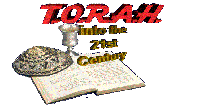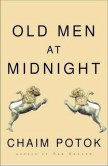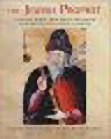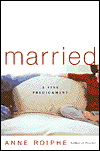 |
 |
 |
 |
 |
 |
 |
Book Selection (If youhave read a good book lately please send me the title and a comment if you wish) mail to: halkin@sympatico.ca
Tree of Life, Tree of Knowledge: Conversations with the Torah
by Michael Rosenak
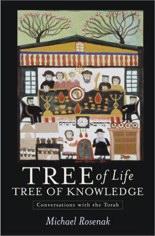
Michael Rosenak's Tree of Life, Tree of Knowledge opens a lively conversation with the stories and laws of the Torah. "What is worth knowing? Conversely, what is a waste of time, or corrosive of character, or simply useless?" Also, "How do we know which goods are worthwhile and which are trivial or harmful? On what grounds do we distinguish between the true and the insignificant or false?" Rosenak views education as a lifelong process, in which individuals journey through various "avenue[s] of educational initiation and encounter." These include parents' teachings, the Jewish communities' teachings from the Torah and relationship with the outside world, and a final stage of "self-education," in which adults, using the language and literature given them by their parents, their community, and the world, make their own choices about how to live. In detailed, learned explorations of each aspect of this educational process, Rosenak teaches readers to look for the common roots of the Torah's restrictive revelation of commandment and prohibition, and its revelation of "creativity, harmony, and the absence of boundaries." --Michael Joseph Gross
|
Holy Brother: Inspiring Stories and Enchanted Tales About Rabbi Shlomo Carlebach
by Yitta Halberstam Mandelbaum, Mandelbaum Yitta Halberstam
Rabbi Shlomo Carlebach was one of the most original and inspired Jewish personalities of the twentieth century. The episodes retold here by Reb Shlomo's followers and admirers underscore his unfailing generosity, his capacity to love unconditionally, and his desire to reconnect every Jew with his or her heritage. As a whole, the collection reveals how many individuals were touched by Reb Shlomo, and serves as a moving tribute to the man many consider a tzaddik (righteous one). The diversity of the tales is staggering, and reveals how intensely active Reb Shlomo was in his pursuit of Jews and others who needed care. Reb Shlomo's outreach to the young seekers of Haight-Ashbury in the 1960s; his gift of his own tefillin (phylacteries), left to him by his father, to a Russian boy who had none for his bar-mitzvah; his uncanny ability to guide others at crossroads; his relationship with the homeless community of New York's Upper West Side - the range of his activities and his contributions is inexhaustible. --
|
 |

The Chosen
by Chaim Potok
(who passed away last week in New York)
Few stories offer more warmth, wisdom, or generosity than this tale of two boys, their fathers, their friendship, and the chaotic times in which they live. Though on the surface it explores religious faith--the intellectually committed as well as the passionately observant--the struggles addressed in The Chosen are familiar to families of all faiths and in all nations.
In 1940s Brooklyn, New York, an accident throws Reuven Malther and Danny Saunders together. Despite their differences (Reuven is a secular Jew with an intellectual, Zionist father; Danny is the brilliant son and rightful heir to a Hasidic rebbe), the young men form a deep, if unlikely, friendship. Together they negotiate adolescence, family conflicts, the crisis of faith engendered when Holocaust stories begin to emerge in the U.S., loss, love, and the journey to adulthood. The intellectual and spiritual clashes between fathers, between each son and his own father, and between the two young men, provide a unique backdrop for this exploration of fathers, sons, faith, loyalty, and, ultimately, the power of love. (This is not a conventional children's book, although it will move any wise child age 12 or older, and often appears on summer reading lists for high school students.)
|
Old Men at Midnight
by Chaim Potok
(who passed away recently in New York)
From Publishers Weekly
(His last novel)
The ninth novel from Potok (The Chosen; My Name Is Asher Lev; etc.) is actually a series of three linked novellas, all of which vividly examine the horrors of war. The link is a woman, Ilana Davita Dinn, to whom three different men tell their stories. In "The Ark Builder," Davita, just out of high school in Brooklyn, gives English lessons to 16-year-old Noah Stremin in 1947. The only Jew from his Polish town to survive the Holocaust, he slowly opens up to Davita, telling her of his friendship with Reb Binyomin, the caretaker of his village's synagogue. As a graduate student in "The War Doctor," Davita encourages visiting lecturer Leon Shertov to write about his experiences under Stalin. A young soldier in World War I, Leon was saved by a Jewish doctor, whom he secretly taught to read Hebrew. Later, Leon became a KGB interrogator, and after World War II, he encounters the doctor again this time as a prisoner, a victim of Stalin's paranoid campaign against physicians. Finally Davita, now a successful author herself, befriends renowned history professor Benjamin Walter as he struggles to write his memoirs. She helps him to remember such pivotal events as his adolescent tutelage under Mr. Zapiski, who served in World War I with his father, as well as his own experiences in World War II. The stories Potok's men tell as they "roar with rage against the void" are as moving as they are riveting. Unfortunately, Davita's role as confessor reduces her to little more than a cipher, and it seems a mistake to have her narrate the first story (Potok at no point sounds like a 17-year-old girl). But "The War Doctor," the grimmest and most nuanced of the stories, alone is worth the price of admission.
|
A Letter in the Scroll:
Rabbi Jonathan Sacks
From Library Journal
At least half of young Jews today are turning their backs on their Jewish heritage, notes Sacks, the chief rabbi of the United Hebrew Congregations of the Commonwealth and author of Faith in the Future and a number of other books. Tracing some of the milestones in Jewish history, he poses questions for these Jews: "What are the claims that Jewish identity makes upon me?" "What is the nature of the collective Jewish journey that I am asked to continue?" "How did we lose the way?" He is proud to be a Jew because of Judaism's moral purpose, commitment to the poor and oppressed, faith in freedom, belief in the Torah, and continuing tradition. He urges young Jews to continue the journey, to pass it on to their children, to be a "letter in the scroll" of the eternal people. A most profound and eloquently expressed meditation, this is highly recommended for all Jews as well as for non-Jews looking to better understand the Jewish legacy and commitment.--
|

The Jewish Prophet: Visionary Words from Moses and Miriam to Henrietta Szold and A.J. Heschel
by Micheal J., Dr Shire, Michael Shire (Editor)
Price $17.50
From Publishers Weekly
A London-based rabbi, Shire is vice-principal of the Leo Baeck College and Center for Jewish Education. In this beautifully illustrated book, he selects 30 individuals who meet his criteria for being called "prophets," which he defines as "men and women who believed they were called to a special task in speaking God's word, and who served as the moral and spiritual leaders of their time." This differs from the conventional perception of a prophet as one who foresees the future, but it is consistent with the 21 books of the Bible that deal with prophets and use the Hebrew word for prophet, navi, meaning "spokesperson for God." For the first of his three categories of prophets, "In the Beginning," Shire adds Moses, Miriam, Hillel, Yohanan ben Zakkai and Akiva to the list of more familiar prophets such Samuel, Amos, Hosea, Isaiah, Micah and Jeremiah. His second category is called "From Generation to Generation," and Shire concludes with "Even in Our Own Time." This last section starts with Theodor Herzl and ends with Abraham Joshua Heschel. Most of the individuals designated by Shire are well-known, but he also includes less familiar names such as Lily Montagu and Hannah Werbermacher. The effort to expand the meaning of "prophet" may cause some raised eyebrows, but Shire builds a strong case for including people who are not in the Bible. Uniform treatment is accorded to each of Shire's "prophets," consisting of quotes, a brief biography and, in many instances, appropriate color illustrations taken from illuminated manuscripts in the British Museum.
|
What Went Wrong?:
Western Impact and Middle Eastern Response
Bernard Lewis
Price: $18.40
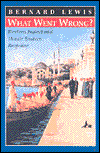
For many centuries, the world of Islam was in the forefront of human achievement--the foremost military and economic power in the world, the leader in the arts and sciences of civilization. Christian Europe, a remote land beyond its northwestern frontier, was seen as an outer darkness of barbarism and unbelief from which there was nothing to learn or to fear. And then everything changed, as the previously despised West won victory after victory, first in the battlefield and the marketplace, then in almost every aspect of public and even private life. In this intriguing volume, Bernard Lewis examines the anguished reaction of the Islamic world as it tried to understand why things had changed--how they had been overtaken, overshadowed, and to an increasing extent dominated by the West. Lewis provides a fascinating portrait of a culture in turmoil. He shows how the Middle East turned its attention to understanding European weaponry and military tactics, commerce and industry, government and diplomacy, education and culture. Lewis highlights the striking differences between the Western and Middle Eastern cultures from the 18th to the 20th centuries through thought-provoking comparisons of such things as Christianity and Islam, music and the arts, the position of women, secularism and the civil society, the clock and the calendar.
Hailed in The New York Times Book Review as "the doyen of Middle Eastern studies," Bernard Lewis is one of the West's foremost authorities on Islamic history and culture. In this striking volume, he offers an incisive look at the historical relationship between the Middle East and Europe.
|
A Guide to Jewish Prayer
by
Rabbi Adin Steinsaltz

For readers who wish to learn about Jewish prayer, A Guide to Jewish Prayer is the first book to read, and the one that will be the cornerstone of any collection of books on the subject. Rabbi Adin Steinsaltz, a world- renowned scholar of Judaic studies and the editor and translator of Random House's 22-volume edition of the Talmud, has written this Guide in order to "open the gates of Jewish prayer for those who want to know and comprehend both its essence and its structure, and the numerous details concerning the various prayer services." Beginning with magisterial essays on the nature of prayer and the history of the Siddur (the common Jewish prayer book), Steinsaltz then moves to a detailed description of the prayer services conducted over the course of the Jewish year, and ends with a series of essays about communal prayer, including chapters on the synagogue, prayer accessories, and the music of prayer. With a comprehensive glossary and short biographies of the many rabbis who have influenced the history of Jewish prayer, Steinsaltz's Guide provides every necessary resource for understanding prayer, for every conceivable reader--from the curious gentile to the devoted Jew. -- Michael Joseph Gross A
|

Principles of Spiritual Activism
by Avraham Weiss
Barnes and Noble Price:
$17.05
From the Publisher
"Over the past three decades, Avi Welss, alongside many colleagues, students, and friends, has engaged in activism on behalf of the Jewish people. Beginning with the movements to free Soviet Jews and to defined the State of Israel, he has taken part in hundreds of demonstrations, marches, vigils, hunger strikes, and acts of nonviolent civil disobedience. In some of the more celebrated of these actions, he has publicly confronted such notorious anti-Semites as David Duke and Louis Farrakhan, climbed over a fence and led supporters in a sit-in to protest the presence of a Carmelite convent at the Auschwitz death camp, and carried a coffin to the official residence of New York City Mayor David Dinkins to decry his allowing police to stand back while Jews were being viciously attacked during the 1991 Crown Heights riots." This book outlines the principles behind those actions. For Avi Weiss, the thread that binds together the moral, political, and tactical equations of activism is Torah. This means that every action is based on a series of principles that are profoundly spiritual in nature. These principles may be likened to the branches of a tree spreading from a trunk of pillar-like strength with roots in the sacred foundation of Torah. The challenge is to ignite the divine spark and become spiritual activists.
|
Holy War, Holy Peace:
How Religion Can Bring Peace to the Middle East
Marc Gopin April 2002
Barnes and Noble Price: $23.96,
Outlines a completely new approach to diplomacy and people-to-people relations in the context of intractable war
The Intifada of 2000-2001 has demonstrated the end of an era of diplomacy in the Arab-Israeli conflict. The style of peacemaking of the Olso Accords has been called into question by the facts on the ground. Elite forms of peacemaking that do not embrace the basic needs of average people on all sides are bound to fail.
The complete neglect of deeper cultural and religious systems in the peace process is now apparent, as is the role that this neglect has played in the failure of the process. Building on his earlier book, Between Eden and Armageddon, Gopin provides a detailed blueprint of how the religious traditions in question can become a principal asset in the search for peace and justice. He demonstrates how religious people can be the critical missing link in peacemaking, and how the incorporation of their values and symbols can unleash a new dynamic that directly addresses basic issues of ethics, justice, and peace.
Gopin's analysis of the theoretical, theological, and political planes shows us what has been achieved thus far, as well as what must be done next in order to ensure effective final settlement negotiations and secure, sovereign, democratic countries for both peoples.
|
Married:
A Fine Predicament
Anne Richardson Roiphe
Price: $17.50
The beloved novelist and observer of modern women's lives offers a wise and bittersweet defense of the joys of married life.
Since she first gave voice to the struggles of a generation of women with Up the Sandbox, Anne Roiphe has been a unique chronicler of how we live in relationships and in families. In Married, Roiphe offers an elegant defense of married life from the wry perspective of a wife and mother who survived the 1950's, the sexual revolution, and the women's movement.
Drawing upon a captivating range of examples from history, literature, and popular culture—ranging from Jane Austen's Emma to Bill and Hillary Clinton—as well as her own two marriages, Roiphe looks at the state of wedded union from an emotional as well as a social perspective. With her trademark blend of wit and wisdom, she explores such questions as why we have marriage, the stresses that threaten a marriage, what marriage asks of us, and what marriage gives to us.
Just as she won women's hearts by celebrating the neglected joys of motherhood in Fruitful (shortlisted for the National Book Award), Roiphe is certain to capture a wide audience with her passionately affirmative answer to the basic question we ask about marriage. Does she think it's worth it? In Married Anne Roiphe answers with a resounding "I do."
Author Biography: Anne Roiphe is the author of several books, including the novels Up the Sandbox and Lovingkindness, the nonfiction Fruitful: A Real Mother in the Modern World (nominated for the National Book Award in 1996), the memoir 1185 Park Avenue, and the collection of literary essays For Rabbit with Love and Squalor. Her articles and reviews have appeared in Vogue, Redbook, Glamour, Working Woman, and Family Circle; she also writes a biweekly column for the New York Observer. She lives in New York City.
|

|
5 Sivan 5762, Thursday May. 16, 2002 (20:19)
What 'clash of civilizations?' By ARNOLD AGES Unholy War: Terror in the Name of Islam - by John L. Esposito Oxford - 196 pages. One of the admirable things about this absorbing work is that the author, a specialist in Islamic Studies at Georgetown University in Washington, DC, makes no attempt to claim objectivity. John Esposito is a skillful apologist for Islam - a defender of the civilization and culture of the Islamic world. Esposito knows his subject well: he has mastered Arabic, the history of Islam, the intricacies of the Sunni and Shi'ite schism, and in this book, he presents a sympathetic portrait of a faith that is terra incognita for most Westerners. Accordingly, he places the most positive construction possible on those aspects of Muslim conduct which are generally abhorred by non-Muslim observers. Esposito admits that the violence so often associated with Islam is rooted in the origins of the religion - when its creators found themselves in constant battle, first with external opponents and second, with internecine strife among the followers. THE OBSESSION with gaining paradise that has driven Muslim martyrs over the centuries - read Muhammad Atta's suicide letter - is subjected to a minute analysis, and in Esposito's version it is far more complex than the 72 virgins scenario which supposedly moves terrorist bombers. In Islamic tradition, the author notes, martyrs are distinguished from others at death because they are deemed to be sinless and "not subject to the post-mortem interrogation of the angels Nakir and Munkar." They are also exempt from purgatory and go directly to the divine throne. Their purity is so great that they are buried in their clothes (with the obvious exception of the suicide bombers). Islam places an emphasis on both coercion and self-sacrifice. More recently, fundamentalist elements have encouraged a tendentious reading of bellicose passages in the Koran, interpreting them as superseding more peaceful verses. ISLAM'S CONQUEST of much of Asia, Africa and part of Europe was interpreted as a sign of divine approval. The eventual decline of Muslim civilization and its domination by foreign powers perplexed the religion's thinkers over the past century and motivated them to find explanations for the reversal. Esposito names Hassan al-Banna, Mawlana Mawdudi and Sayyid Kut'b as the architects of a modern Islamic radicalism that seeks to explain why the West triumphed over Islam. These flexible fundamentalists exhibited astute powers of intellectual analysis. They promoted the Koran and Islam as an all-pervasive civilization, and pleaded for a detachment from Western values and symbols. They also endorsed scientific research within an Islamic context, and validated jihad both as a conceptual value system and as a call to action. After 1948, and in the wake of the subsequent Arab-Israel wars, groups such as the Muslim Brotherhood in Egypt embraced the idea of jihad in its most violent form - as a war of extermination against unbelievers. This view has now been propelled into a major doctrinal force by groups such as Hamas, Islamic Jihad and al-Qaida. For Esposito, Muslim violence is not just driven by religious zealotry, but by frustration and anger at American and Israeli policy. As for the terrorists who have murdered thousands of Israeli civilians, the author supplies familiar rationales - retaliation, oppression, victimhood, unrealized promises, despair, lack of hope and - the efficacy of suicide attacks on enemy morale. In the last section of this informative volume, Esposito rejects the "clash of civilization" thesis that has become popular among pro-Western thinkers. He argues that Islam is a religion with great traditions of tolerance, and points to the possibility of a return to this ideal - providing that the US stops coddling Israel. This book is an eloquent defense of Islam, but Esposito's willingness to rationalize religious barbarism is terribly disappointing. Still, there is much merit in Esposito's treatise because it is one of the clearest expositions of how Muslims today view the world. The reviewer is a Canadian-based academic and regular contributor
|

Maimonides : A Spiritual Biography (Lives and Legacies.)
by Ilil Arbel
Price: $13.97
From Booklist
Sage in the care of the body as well as the soul, Maimonides shines as one of the brightest intellects in an age of oppression and ignorance. Readers who allow Arbel to transport them back to that harsh era will marvel at how one man--relentlessly harassed because of his Jewish faith, repeatedly forced to move to alien new lands, stranded in isolation and poverty--doggedly pursued his sacred and secular studies until he completed an intellectual synthesis that affected the entire Mediterranean world--Jewish, Arab, and Christian. Without burdening readers with the technicalities, Arbel illuminates Maimonides' accomplishments in condensing the entire body of Jewish law into one accessible volume, the Mishnah Torah, and in reconciling religious tradition with contemporary scientific and philosophic thought in his Guide for the Perplexed. Though centuries distant, the controversy surrounding Maimonides' works still highlights the courage of a true innovator. The same intellectual daring shines through the astonishingly modern work Maimonides did in physiology late in life. An ideal introduction to a complex figure. Bryce Christensen
Copyright © American Library Association. All rights reserved
|
Climbing Jacob's Ladder: One Man's Journey to Rediscover a Jewish Tradition Alan Alan Morinis Price: $19.16
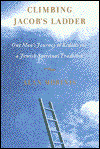 Jewish by birth, though from a secular family, Alan Morinis took a deep journey into Hinduism and Buddhism as a young man. He received a doctorate for his study of Hindu pilgrimage, learned yoga in India with B. K. S. Iyengar, and attended his first Buddhist meditation course in the Himalayas in 1974. But in 1997, when his film career went off track and he reached for some spiritual oxygen, he felt inspired to explore his Jewish heritage. In his reading he happened upon a Jewish tradition of spiritual practice called Mussar. Gradually he realized he had stumbled on an insightful discipline for self-development, complete with meditative, contemplative, and other well-developed transformative practices designed to penetrate the deepest roots of the inner life. Eventually reaching the limits of what he could learn on his own, he decided to seek out a Mussar teacher. That was not easily achieved, since almost the entire world of the Mussar tradition had been wiped out in the Holocaust. In time, he did find an accomplished master who stood in an unbroken line of transmission of the Mussar tradition, and who lived at the center of a community of Orthodox Jews on Long Island. This book tells the story of Morinis’s journey to meet his teacher and what he learned from him, and reveals the central teachings and practices that are the spiritual treasury and legacy of Mussar. Alan Morinis has written this book because the wisdom and practices that helped him so much have not penetrated the world beyond the confines of Orthodox Judaism, and may not be fully appreciated even there at this time. His hope is that Jews and non-Jews alike will find in Mussar a time-tested path ofspiritual practice that will help them discover the hidden radiance within.
|
Letters to Auntie Fori : The 5000-Year History of the Jewish People and Their Faith by Martin Gilbert
Barnes and Noble Price: $18.20
Martin Gilbert's Letters to Auntie Fori is a proud, 140-part epistolary history of the Jews as well as a parsing of the basic tenets of the faith and the meaning and form of its holy days and ritual observances. Beginning with the first chapter of Genesis, Gilbert follows his people through five millennia, concluding with the founding of Israel and, briefly, the political and religious Middle-Eastern turmoil of the present day. Especially interesting are his chapters on the Diaspora, as well as brief summaries of Jewish heroes in World War I, the dark horrors of World War II, and short recitals of Jewish luminaries in industry, politics, sports, and the arts and sciences. Though Gilbert is hardly a disinterested narrator, his erudite informality (the recipient of his letter-chapters is a well-educated and elderly friend effectively innocent of any knowledge of Judaism) serves his complex subject admirably. --H. O'Billovitch
|

|
 |
 |
 |
 |
|
|
 |
To get your books or CD's for gifts or study, and save a
high rate of % discount. Just enter in the URL line the following
http://www.amazon.com/exec/obidos/redirect-home/toraintothe21stc
(Amazon contributes 5% to "Torah in the 21st Century")
|
 |
|
 |
 |
 |
 |
|
 |
 |
 |
 |
 |
|
 |
 |
 |

|
 |
